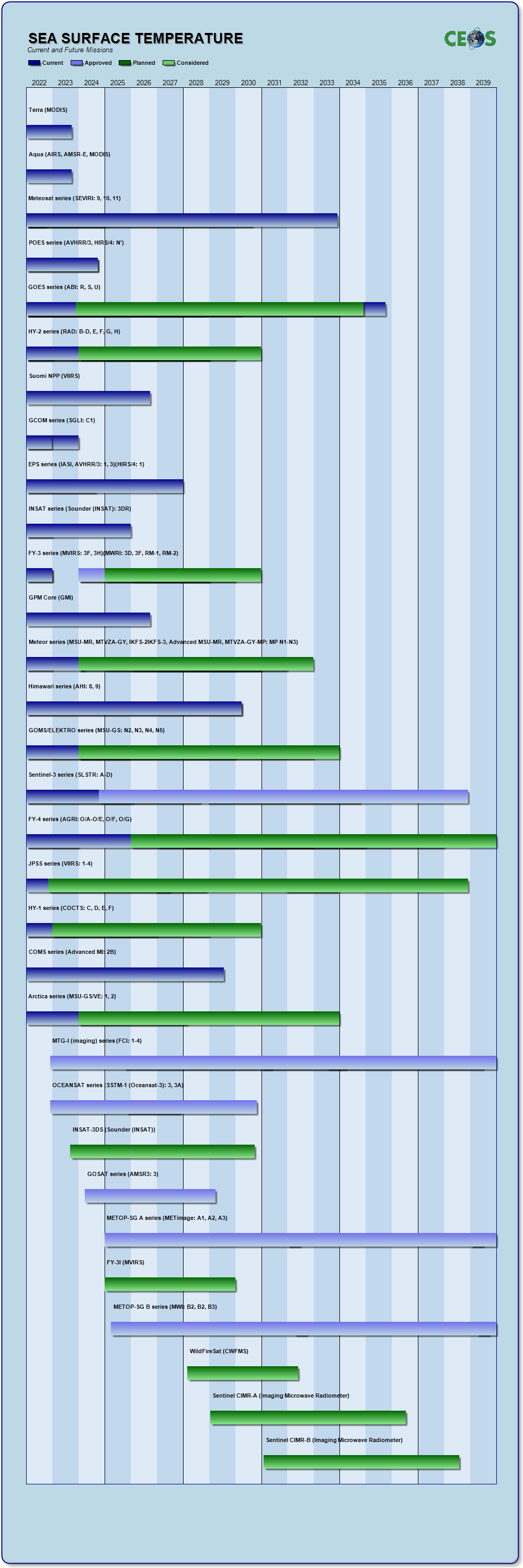SST-VC: What Have They Been Up To?
The Sea Surface Temperature Virtual Constellation (SST-VC) serves as the formal link between the Group for High-Resolution Sea Surface Temperature (GHRSST) and the broader CEOS community. GHRSST is an open international science group that promotes the application of satellites for monitoring sea surface temperature (SST) by enabling SST data producers, users and scientists to collaborate within an agreed framework of best practices. GHRSST provides a framework for SST data sharing, best practices for data processing and a forum for scientific dialog and advancement. As such, the connection with CEOS is key to the mission of GHRSST, with the SST-VC providing a means for CEOS to present its needs and requirements to GHRSST, and likewise for GHRSST to present its needs directly to CEOS and the global community of space agencies.
GHRSST and the SST-VC have been producing standardised satellite-based sea surface temperature products in netCDF (network Common Data Form) since 2005. Datasets are typically available within a few hours of observation for near real time data feeds, or for Level 3 and 4 products within 24 hours or less. GHRSST daily datasets are made available through the GHRSST Global Data Assembly Center at the National Aeronautics and Space Administration (NASA) Jet Propulsion Laboratory (JPL) Physical Oceanography Distributed Active Archive Center, the European Copernicus system and various other distribution venues, such as the Japanese Aerospace Exploration Agency (JAXA). Long-term archiving has been implemented at the GHRSST Long Term Stewardship and Reanalysis Facility at the National Oceanic and Atmospheric Administration (NOAA) National Centers for Environmental Information. All GHRSST/SST-VC datasets are also accessible via the CEOS International Directory Network (IDN) and the CEOS-WGISS (Working Group on Information Systems and Services) Integrated Catalog (CWIC).

Timeline of CEOS Sea Surface Temperature missions, as produced with the CEOS Database (database.eohandbook.com).
Recently, the GHRSST Project Office and science team members have built and implemented a new federated metadata management, data discovery and distribution framework based on a number of information technologies including the CEOS Opensearch specification. This system is comprised of a centralised dataset metadata catalogue of all GHRSST datasets, where users can query for datasets based on a faceted and free text search interface and discover the granule Opensearch endpoints hosted at specific data repositories (e.g. JPL PO.DAAC, Copernicus Hub, NOAA, JAXA etc.). The platform will be ready for public release in 2023.
SST-VC’s primary objective is the development and improvement of sea surface temperature products including the SST Essential Climate Variable. SST is a vital component of the climate system as it exerts a major influence on the exchanges of energy, momentum and gases between the ocean and atmosphere. SST largely controls the atmospheric response to the ocean at short, medium and long time scales.
The SST-VC has focused on increasing the visibility of the impact of the passive microwave (PMW) satellite constellation on SST applications and to communicate the importance of the continuity of the PMW capability for SST. This began with a presentation in June, 2016 at the 44th meeting of the Coordination Group on Meteorological Satellites (CGMS-44) on “Passive Microwave Constellation for Sea Surface Temperature”. In September, 2016, the SST-VC followed with a presentation to the CEOS SIT Technical Workshop on “The Importance of PMW Constellation for SST and Impacts“. The SST-VC also contributed a presentation at the joint ECMWF/ESA workshop, in December 2017, on using low-frequency, passive microwave measurements in research and operational applications, titled, “The Use and Impacts of Sea Surface Temperature from Passive Microwave Measurements”.
In 2020, SST-VC published the “Current and future sea surface temperature missions: Towards 2050” report, which summarised the next-generation SST constellation, including on-orbit assets, measurement methods, fiducial reference measurements, and data management systems. Key challenges related to provision of Fiducial Reference Measurements (FRM) and data management were highlighted in the report. One urgent need was identified, for sustained continuity of passive microwave SST determination using a 6.9 GHz channel in an operational (redundant) context.
Since 2021, SST-VC has worked closely with CEOS stakeholders including the CEOS Analysis Ready Data (ARD) Oversight Group and the Land Surface Imaging Virtual Constellation (LSI-VC) to produce the initial CEOS Analysis Ready Data Product Family Specification (PFS) Template and the revised CEOS-ARD Governance Framework. The SST-VC is continuing to work on this topic, with the goal to develop a new PFS for SST in the near future.
The CEOS Ocean Coordination Group was established in March 2022 with a mandate to collectively identify the commonalities, synergies and gaps within CEOS Virtual Constellations and other CEOS groups that would contribute towards formulating a CEOS “ocean and coastal strategy”. SST-VC is an active member of the group, with other members from marine-focused virtual constellations and related CEOS groups, including:
- OCR-VC (Ocean Color Radiometry),
- OSVW-VC (Ocean Surface Vector Winds),
- OST-VC (Ocean Surface Topography),
- COAST (Coastal Observations Applications Services and Tools) Ad-hoc team,
- COVERAGE (CEOS Ocean Variables Enabling Research and Applications for GEO) group,
- WGClimate (Working Group on Climate),
- WGCV (Working Group on Calibration and Validation), and
- WGISS (Working Group on Information Systems and Services).
These members are tasked with identifying the value CEOS provides to the broader global ocean community, in the context of each group’s activities. The group has found that CEOS requires a dedicated coordination of CEOS Ocean activities to support both the UN Decade on Ocean Science for Sustainable Development and the UNFCCC Global Stocktake.
The SST-VC also continues to support the CEOS COVERAGE and COAST initiatives. In 2023, the SST-VC intends to contribute to the emerging CEOS Interoperability Framework and CEOS coordination with international standards organisations with regard to ARD.